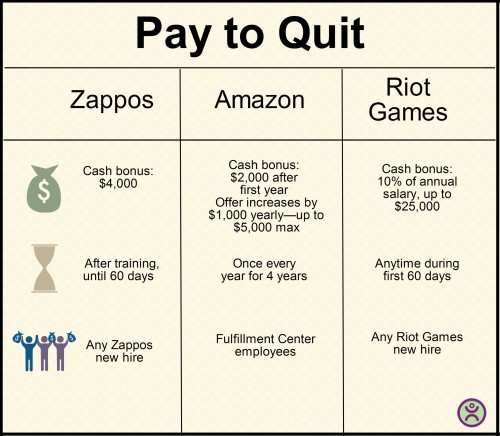Two popular tech companies have followed in Zappos’ footsteps in weeding out negative attitudes from the pack.
Like Zappos, both Amazon and Riot Games (the company behind the PC game “League of Legends”) have implemented a system that allows their people to quit their jobs with a pretty sweet cash bonus. It’s an incentive to weed out folks who just don’t have their hearts in the long-term mission and success of the company.
“We want to make sure that [people] are here for more than just a paycheck. We want people that believe in our long-term vision and want to be part of our culture,” Tony Hsieh, CEO of Zappos said when he first pioneered this method of building his team.
"We want to make sure that [people] are here for more than just a paycheck."
Why implement this unconventional approach to talent retention?

1. In the Larger Picture, They’re Saving in Personnel Costs and Time
One study by Leadership IQ found that 46 percent of newly hired employees will fail within 18 months.
That’s quite an alarming stat. And, if it’s at least somewhat accurate—the costs associated with a “wrong” hire can really add up. Tons of research has proven this. This infographic via Mind Flash offers an interesting breakdown of the cost of a “bad hire.”
E.g.: 41 percent of companies they surveyed said that a bad hire cost them $25,000 in the last year. And 25 percent of companies they surveyed said it cost them $50,000 in the last year!
Now, we know these stats should be taken with a grain of salt. But, when you’re looking at the big, holistic picture: budgeting $2,000 for disgruntled folks may not be a terrible deal for companies who are confident in their strong, successful culture.
2. The Incentive Keeps People Who are Invested Long-Term
After all, if a few stacks are appealing enough to quit, then you probably aren’t
that invested in the company anyway.
“Culturally aligned people and teams are more effective, and alignment around mission and values allows us to better serve players. We’ve designed Queue Dodge to help self-identified mismatches move on in an open, positive and constructive way," Riot Games says in a blog post.
Amazon’s approach is slightly different in that it forces employees to reevaluate their true feelings—not just soon after they’re hired—but each year for up to four years after that. This means—each year—Amazon’s fulfillment staff has to take a minute and reflect on whether or not they want to continue working there.
3. ‘The Power of Resisted Temptation’ Can Weed Out Bad Attitudes
There's an interesting psychological effect that happens to employees when they’re offered a limited-time offer to quit and run with a cash bonus.
“The vast majority of trainees turn down the offer during training—resisting the temptation to take the money and run,” says Ian Ayres, lawyer and economist, in a Freakonomics post. “Then, almost no one quits in the initial months after training because they’d feel like fools to quit for nothing when they could have quit for money.”
Ayres’ point offers a great, unique angle of retaining your employees through the pay-to-quit program.
The cash bonus incentive has the potential to diminish disgruntled workers. If you’re not happy, what are you still doing here?













